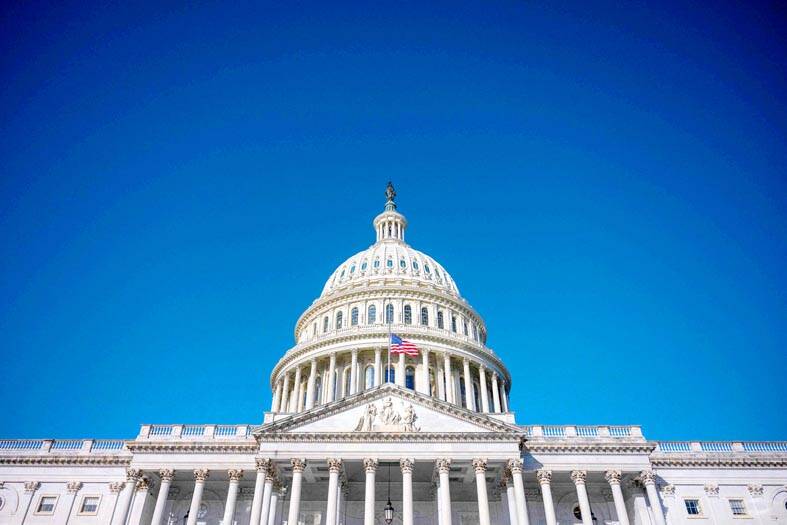A bipartisan bill was put forward in the US Senate on Wednesday with the aim of renaming Taiwan’s representative office in Washington to reflect “the reality” that it represents the people of Taiwan, the sponsors said.
The proposed Taiwan representative office act seeks to change the name of the Taipei Economic and Cultural Representative Office (TECRO) to the Taiwan Representative Office (TRO).
The bill “underscores the United States’ commitment to Taiwan’s democracy and enhances clarity in the US-Taiwan relationship,” said a statement issued by Republican Senator John Curtis, who was the sponsor along with Democratic Senator Jeff Merkley.

Photo: AFP
In 2023 and last year, similar bills were introduced in the House of Representatives and the Senate, but did not gain enough traction to advance in either chamber.
Curtis, who was then a member of the House, put forth one of the bills, while then-senator Marco Rubio sponsored the other, during the last two years of former US president Joe Biden’s term.
Taiwan’s representative offices in countries with which it does not have diplomatic ties are typically named the Taipei Economic and Cultural Office or the Taipei Representative Office, in keeping with the host countries’ preference to avoid any references that would imply Taiwan is a separate country from China.
Curtis was quoted in the statement as saying that the US should not tolerate pressure from China “to undermine the Taiwanese people.”
Instead, the US should “stand by its democratic allies and friends around the world facing pressure and coercion from authoritarian regimes,” he said.
“By renaming TECRO as the Taiwan Representative Office, our bill acknowledges the reality that this office represents the people of Taiwan, not just the economic interests of the city of Taipei,” he added.
Merkley said that the bipartisan bill demonstrates the US’ longstanding commitment to supporting Taiwan by properly recognizing its status.
“We must continue to send a strong message that the United States will use all resources at our disposal to foster healthy, robust relationships with our democratic partners, including Taiwan,” Merkley was quoted as saying in the release.
The two senators also said that changing TECRO’s name would not contravene the US’ “one China” policy or alter its position on Taiwan’s international status.
The proposed legislation directs the US secretary of state to engage in negotiations with Taiwan’s representative office in Washington to facilitate a name change, the two senators said.
If the renaming effort succeeds, all US government documents, laws, maps and records referring to TECRO would be updated to TRO, the bill says.

Intelligence agents have recorded 510,000 instances of “controversial information” being spread online by the Chinese Communist Party (CCP) so far this year, the National Security Bureau (NSB) said in a report yesterday, as it warned of artificial intelligence (AI) being employed to generate destabilizing misinformation. The bureau submitted a written report to the Legislative Yuan in preparation for National Security Bureau Director-General Tsai Ming-yen’s (蔡明彥) appearance before the Foreign Affairs and National Defense Committee today. The CCP has been using cognitive warfare to divide Taiwanese society by commenting on controversial issues such as Taiwan Semiconductor Manufacturing Co’s (TSMC, 台積電) investments in the

INVESTIGATION: The case is the latest instance of a DPP figure being implicated in an espionage network accused of allegedly leaking information to Chinese intelligence Democratic Progressive Party (DPP) member Ho Jen-chieh (何仁傑) was detained and held incommunicado yesterday on suspicion of spying for China during his tenure as assistant to then-minister of foreign affairs Joseph Wu (吳釗燮). The Taipei District Prosecutors’ Office said Ho was implicated during its investigation into alleged spying activities by former Presidential Office consultant Wu Shang-yu (吳尚雨). Prosecutors said there is reason to believe Ho breached the National Security Act (國家安全法) by leaking classified Ministry of Foreign Affairs information to Chinese intelligence. Following interrogation, prosecutors petitioned the Taipei District Court to detain Ho, citing concerns over potential collusion or tampering of evidence. The

‘COMPREHENSIVE PLAN’: Lin Chia-lung said that the government was ready to talk about a variety of issues, including investment in and purchases from the US The National Stabilization Fund (NSF) yesterday announced that it would step in to staunch stock market losses for the ninth time in the nation’s history. An NSF board meeting, originally scheduled for Monday next week, was moved to yesterday after stocks plummeted in the wake of US President Donald Trump’s announcement of 32 percent tariffs on Taiwan on Wednesday last week. Board members voted to support the stock market with the NT$500 billion (US$15.15 billion) fund, with injections of funds to begin as soon as today. The NSF in 2000 injected NT$120 billion to stabilize stocks, the most ever. The lowest amount it

NEGOTIATIONS: Taiwan has good relations with Washington and the outlook for the negotiations looks promising, Minister of Economic Affairs J.W. Kuo said Taiwan’s GDP growth this year is expected to decrease by 0.43 to 1.61 percentage points due to the effects of US tariffs, National Development Council (NDC) Minister Paul Liu (劉鏡清) said at a meeting of the legislature’s Economics Committee in Taipei yesterday, citing a preliminary estimate by a private research institution. Taiwan’s economy would be significantly affected by the 32 percent “reciprocal” tariffs slapped by the US, which took effect yesterday, Liu said, adding that GDP growth could fall below 3 percent and potentially even dip below 2 percent to 1.53 percent this year. The council has commissioned another institution